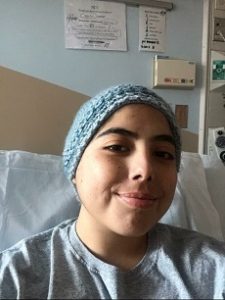
On May 10, Alexis Miranda ’20 was celebrating her Syracuse University graduation with a degree in film from the College of Visual and Performing Arts and making plans for her future. She had just signed a lease for a new apartment in Syracuse and was planning to transition to full-time employment at University College, where she had worked part-time while an undergraduate.
But two days later, those plans would be put on hold when Miranda was told she had acute lymphoblastic leukemia (ALL).
“One of my white blood cells is very cancerous and is attacking my other cells,” she explains. “It’s reproducing very rapidly and not allowing for good white blood cells to reproduce.”
Instead of moving and starting her new job, Miranda began a round of chemotherapy at Upstate Medical University. When that didn’t have the desired effect, she returned to her family in Los Angeles, California, for a month of more aggressive chemotherapy.
In truth, she hadn’t felt well for months. She’d been diagnosed with mononucleosis in the fall. Once she finished up her spring semester course work, she finally made time to see her primary care physician. After a blood test, she was sent to a hematologist.
The best treatment for ALL is a bone marrow transplant and Miranda’s doctors immediately tested her family. With the best option her father at a half match, they turned to the National Bone Marrow Registry. With no match there, her family has launched an awareness campaign to encourage people of color to register.
When it comes to matching human leukocyte antigen (HLA) types, a patient’s ethnic background is important in finding a match. Because HLA markers are inherited and some ethnic groups have more complex tissue types than others, a person’s best chance of finding a donor is likely with someone of the same ethnic background. Latinos, Blacks, and Asians are hugely underrepresented in the registry.
Miranda is of Mexican descent. Unfortunately, her cancer is progressing quickly and she cannot wait any longer to find a full match. On August 7 she will undergo a bone marrow transplant with her father as her donor. “I need to have the transplant sooner rather than later,” she says.
Nonetheless, her family is committed to expanding the diversity of the registry. “We want to get the word out that it’s so important for not just Hispanic people, but also African Americans, Asians and Pacific Islanders to register, because the percentages for the possibility of somebody of any of those ethnicities to find a match is extremely low in comparison to White Americans,” says her mother, Maria Rodriguez.
The process is simple, adds her brother, Michael Miranda. “You can sign up online and they send you a postage-paid swab kit. You swab the inside of your cheek and mail it back,” he says.
For more information, visit join.bethematch.org/curealexis or text curealexis (one word) to 61474.
This article originally appeared on the website of Syracuse University’s Office of Multicultural Advancement: https://alumni-of-color.syr.edu/news/cure-alexis/
